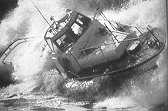April 2006
BOOK REVIEW
- by Carol Standish
 Ten Hours Until Dawn
Ten Hours Until Dawn
Michael J. Tougias
St. Martin�s Press, 320 pp, $24.95
The �Blizzard of �78� slammed into the New England coast in February of that year. Today it could be designated a �cat 4 hurricane. The storm hit south of Boston hardest but the Massachusetts north shore, Cape Ann as well as the New Hampshire and Maine coast were pummeled by 90-plus mph winds, white-out snow conditions and horrendous seas. Everyone who experienced that extraordinary storm stores a memory.
My family and I were at home on high ground which overlooked a Maine harbor. The lighthouse and its tiny rocky island at the harbor entrance, usually a picturesque attraction from the nearby mainland, were invisible for two days, first from the snowfall, then from the flood. The light keeper, a �Coastie� and his family survived the storm, he in the tower, she and their two babies in the upstairs leeward bedroom of the keeper�s cottage. Worried sick as the island disappeared under giant roller; we stayed in touch by phone until the lines failed. The family was rescued by helicopter when the skies finally cleared two days later. They moved back to the Midwest. the harbor entrance, usually a picturesque attraction from the nearby mainland, were invisible for two days, first from the snowfall, then from the flood. The light keeper, a �Coastie� and his family survived the storm, he in the tower, she and their two babies in the upstairs leeward bedroom of the keeper�s cottage. Worried sick as the island disappeared under giant roller; we stayed in touch by phone until the lines failed. The family was rescued by helicopter when the skies finally cleared two days later. They moved back to the Midwest.
Author, Michael Tougias tapped other memories of the �Blizzard of �78� for his new book Ten Hours Until Dawn The True Story of Heroism and Tragedy Aboard the Can Do.  As the storm approached a distress call was sounded by a Greek tanker anchored off Marblehead, Massachusetts. A 44-foot Coast Guard cutter was dispatched. Before it reached its destination, electronics went down and a 90-footer was sent to rescue them both. The weather settled in for a huge blow, more than 90 mph winds whipping up forty-foot seas and higher. As the storm approached a distress call was sounded by a Greek tanker anchored off Marblehead, Massachusetts. A 44-foot Coast Guard cutter was dispatched. Before it reached its destination, electronics went down and a 90-footer was sent to rescue them both. The weather settled in for a huge blow, more than 90 mph winds whipping up forty-foot seas and higher.
Frank Quirk, a Gloucester Harbor pilot was just winding up his day on his 49-foot steel-hulled pilot boat, Can Do when he also heard the tanker�s distress call. Knowing that he was closer to the tanker than any of the coast guard boats which would be steaming northeast from Boston and points south, he offered to answer the call as well. A cautious middle-aged man with a healthy respect for the sea and about as salty as you can be in terms of skill, Quirk was not grandstanding. He said only that he�d �give it a try.�
Tougias describes in a broad sweep the chaos which subsequently reigns on all fronts: the tanker, the Coast Guard vessels, the failures of the centers of command and communications,  the efforts to stay in touch with all the boats with jerry-rigged equipment and alternate operators, not to mention the high anxiety of the families of those caught at sea (there were four men aboard the Can Do besides Quirk). All of that high drama functions as background static for the account of the grim hours in the wheel house of the Can Do that makes up the bulk of the book. Using verbatim recordings of Quirk�s conversation with a land based ham radio operator who picked up the Can Do�s signal after the coast guard lost contact he convincingly imagines the last six harrowing hours of the pilot boat men�s ordeal. the efforts to stay in touch with all the boats with jerry-rigged equipment and alternate operators, not to mention the high anxiety of the families of those caught at sea (there were four men aboard the Can Do besides Quirk). All of that high drama functions as background static for the account of the grim hours in the wheel house of the Can Do that makes up the bulk of the book. Using verbatim recordings of Quirk�s conversation with a land based ham radio operator who picked up the Can Do�s signal after the coast guard lost contact he convincingly imagines the last six harrowing hours of the pilot boat men�s ordeal.
I am not a fan of the genre of �dramatized truth� or whatever the current label is for pushing the factual envelope emotionally, but in this case, Tougias does a good job of resisting the impulse to conjecture. Although he occasionally indulges in the past plu-perfect �it must have seemed to X that�� he has so much grounded research at his command that these indulgences can be �indulged� even by a reader who enjoys drawing his/her own conclusions from the material presented.
Ten Hours Until Dawn is a fast-paced read about real people in real trouble. When the author digresses to provide historical background and other fluff outside the time line of the action, the reader is tempted to skip ahead because the main tale is so compelling. After the tragedy, however, he provides the necessary details regarding the families of the lost which the reader craves. While most relatives eventually get a grip on their lives and move on, the story is also a sad commentary on the ripple effect of tragedy.
|